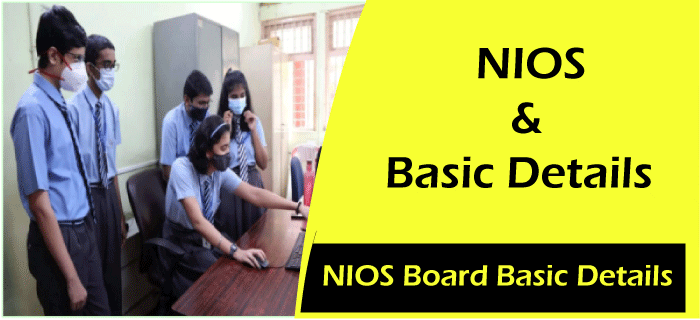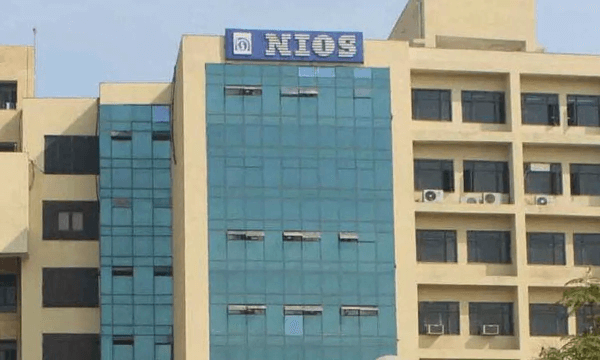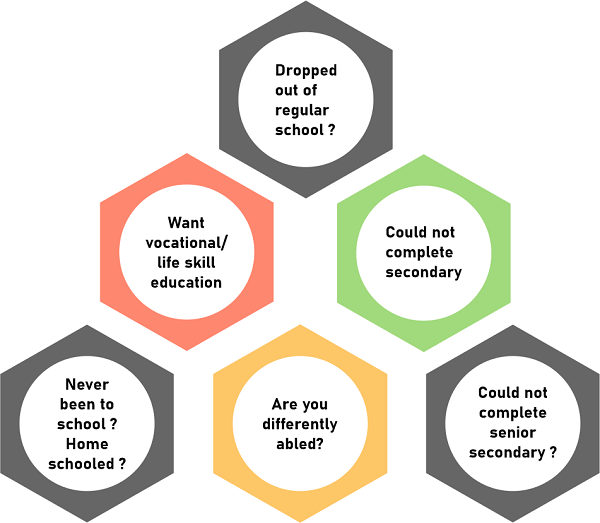What is the Full Form of NIOS
NIOS: National Institute of Open Schooling
NIOS stands for National Institute of Open Schooling. The National Institute of Open Schooling (NIOS), originally known as the National Open School (NOS), was founded by the Ministry of Education (MOE), Government of India, in November 1989 as an autonomous organization following the National Policy on Education 1986. Additionally, it provides elementary courses as part of its Open Basic Education Programs (OBE). The Government of India granted NIOS the ability to assess and certify students enrolled in its pre-degree courses, whether they are taking academic, technical, or vocational courses, by gazette notice. By letter No. E.V./11(354)/91/, dated July 25, 1991, the Association of Indian Universities published the Equivalence of Senior Secondary Certificate Examination of NIOS.
NIOS formulates its policies through its General Body, which is presided over by the Union Minister of Human Resources Development. The institutional area of Sector-62 in NOIDA is where the NIOS headquarters are situated at A-24/25 (U.P.).
Vision
"Sustainable inclusive learning with flexible access to high-quality school education" is the vision.
Mission
- Delivering relevant, ongoing, and comprehensive education through an open and distance learning system up to the pre-degree level.
- Increasing the availability of schooling for all, meeting the educational requirements of the prioritized target groups for social justice and equity achieving the unachieved goals.
- The NIOS has unique qualities and plays a significant part in the National System of Education.

The primary goals of NIOS are:
- In response to requests from the respective Government(s) or suo moto, to offer expert recommendations to the Government of India and the States about the effective development of Open and Distance Learning Systems at the school level.
- To provide academic and vocational education programs based on need that will provide for a living and promote lifelong learning up to the pre-degree level.
- Accrediting institutions for creating efficient systems for supporting learners to enable learning up to the pre-degree level.
- To advance open education at the national and international levels through collaboration, resource sharing, developing capacity, and quality control.
- To letting everyone regardless of anything can apply to the courses and programs that NIOS offers, regardless of caste, creed, or geography.
Its top priority target audiences are:
- Urban and rural residents.
- The disadvantaged
- Unemployed and part-time workers from underprivileged social groups
- School abandonment
- Individuals with disabilities, people who are both physically and psychologically challenged
- Minorities
Activities and Programs
NIOS carries out six main sets of activities which are:
- Providing Open Basic Education-level academic instruction
- Delivering a secondary and senior secondary education
- Teacher education
- Vocational Education
- Training and Research
- Support services for learners
Like the CBSE and the CISCE, the NIOS is a national board conducting secondary and senior-level exams. It was formed in 1989 by the Ministry of Human Resource Development of the Government of India to promote flexible learning and offer education to all societal groups. The Association of Indian Universities, the University, and the NIOS acknowledge the secondary and senior credentials issued by the NIOS.
About 50,000 people have enrolled in NIOS overall. The biggest open schooling system in the world, it enrolled roughly 350,000 students annually and served 1.5 million secondary and senior secondary students between 2004 and 2009 at those levels.

International Cooperation and Foreign Locations
The Commonwealth of Learning (COL) and UNESCO partner with the NIOS.
Courses Offered by NIOS
- Open Basic Education (OBE) program for those over 14 offers lessons at levels A, B, and C, similar to grades III, V, and VIII in a traditional school system.
- Secondary Course which is Class-X equivalent
- Class XII-level senior secondary coursework
- Courses in Vocational Education
- Life-enriching activities
However, one is also qualified to sit in the Level and Senior Secondary On-Demand Exams in those topics only in which applicants have registered with NIOS for subject-specific instruction. Six weeks following the final test date, the results of the public examinations are often revealed.
Duties & Functions
- To create the necessary action plan to ensure equity and inclusion in education for underrepresented and disadvantaged groups such as girls and women, minorities, and those who are differently abled (physically and mentally challenged), etc.
- To provide a broad range of general, vocational, continuing, and life-enrichment courses up to the pre-degree level.
- To provide curriculum and self-study materials that are based on need and that emphasize skill development to provide multi-media and multi-channel delivery systems for the efficient exchange of course materials to support programs and courses.
- To create study centers in agencies, organizations, and institutions in India and overseas to give efficient student support services for helping learners.
- To administer tests and provide diplomas to outstanding students.
- To collaborate with National Literacy Mission's Equivalency Program to educate and certify neo-literates.
- To maintain standards that are equivalent to those in the formal education system while keeping the unique characteristics of ODL and to improve the quality of learning in ODL via Monitoring, Supervision, and Evaluation.
- To engage in open schooling-related research, innovation, and development initiatives and communicate the results to all stakeholders.
- To create a database on open education.
- To serve as a resource organization and a center for building capacity in both national and worldwide open schooling.
- Partnering with local, national, and worldwide organizations to promote open education.
- To collaborate with government initiatives and programs in the educational sector to advance the goals and objectives of the nation.
- To offer institutions, organizations, and agencies in India and beyond professional/technical consulting in the area of ODL.
Quality Control
To ensure learner satisfaction and ongoing development of their Quality Management System, they at the National Institute of Open Schooling (NIOS) are committed to providing excellent, sustainable, inclusive, and flexible education up to the pre-degree level through open and distance learning (ODL) mode and compliance with requirements and to aid in the universalization of education in schools.

Objectives
- To achieve excellence in creating top-notch open-and distance-learning courseware for students.
- To certify educational institutions for creating efficient systems for supporting learners up to the pre-degree level.
- Precise Information from the National Institute of Open Schooling (NIOS)
Installation of NIOS
Began in 1979 as an "Open Schooling" experiment run by the Central Board of Secondary Education (CBSE), the Government of India, Ministry of Education, established the National Open School (NOS) in 1989. (MOE). In 1990, the Indian government granted NOS the right to use the right to inspect and certify students who have enrolled in courses up to the pre-degree level. In July 2002, it received a new name: National Institute of Open Schooling (NIOS).
Regional Hubs
A list of cities with significant population centers includes Dharamshala, Vishakhapatnam, Sikkim (Gangtok), and Amethi (Sub Regional Centre as Darbhanga, Kota)
Quantity of Study Centers
There are three thousand five hundred and thirty academics, including twenty-six in the United Arab Emirates, Nepal, Kuwait, Qatar, Muscat, and the Kingdom of Bahrain. One thousand three hundred and seventy-nine vocational (AVIs). One thousand three hundred and thirteen OBE (A.A.s) Open Basic Education.
For academic courses, accredited vocational institutions (AVIs), and open basic education (OBE) courses, the study centers are referred to as accredited institutions (A.I.s), accredited agencies (A.A.s), and accredited agencies, respectively.
Enrolment
Total Enrolment: 2.71 Million
Primary - 46%
Secondary Senior - 49%
Vocational - 5%
The largest open schooling system worldwide is NIOS. For grades 10th and 12th, admission to NIOS is entirely online, with cut-off dates.
Courses Provided
Accredited Agencies provide Open Basic Education (OBE) (A-level, B-level, and C-level courses), which are similar to 3rd, 5th and 8th classes in formal education (A.A. s). Secondary education, leading to a secondary school diploma. Senior secondary, which leads to a senior secondary school diploma and vocational education which is open.
Features and Flexibility
- Choice of subjects; ongoing evaluation through tutor-marked assignments (TMA).
- Online admissions and exam registration capability Credit accumulating capability.
- Nine opportunities in five years to finish a course.
- Re-admission is permitted after five years.
- Support for learning through a Personal Contact Program.
- Transfer of up to two subjects worth of credits from some other Boards.
- Media programs are aired and televised.
Study Resources
Study guides that are printed and accompanied by audio-visual programs. The learners are also given a half-yearly magazine called "Open Learning."
Instructional Techniques
At the secondary level, there are media in Hindi, English, Urdu, Marathi, Telugu, Gujarati, and Malayalam. The senior secondary level offers Hindi, English, and Urdu as mediums. There is a freedom to react in any language of the schedule.
Chairperson's Message
Education is a chariot that propels the country on its path to total growth. Education is a potent tool for bringing about the positive changes that society and the globe need. As a result, it is essential to both individuals and society.
With an expanded focus on the following essential themes, the new education policy 2020, which is in the front, now offers insight into changes at all levels of education, from K-12 to higher education.
- Indian-focused education
- Sustainability
- Access
- Equity
- High calibre
Additionally, it emphasizes openness, responsibility, civic engagement, social integration, research and innovation, analytical and critical thinking skills, and the growth of public financial management. The overarching goal is to create synergy between teacher training, school education, skill development, capacity building, full governance, regulation adjustments, and revamping.
With the preceding in mind, NIOS is dedicated to the lines listed below:
- Education from the traditional knowledge of India to modern, updated, and innovation-focused education
- Early in the educational process, talents range from basic education to contemporary soft and vocational skills.
- Economic changes based on employability and local resources (swadeshi) promote self-reliance.
- From UPNISHADAS teachings to UNESCO's Millennium2030 objectives, value-based education.
While envisioning and pursuing those as mentioned earlier, we are devoted to the following modern practices:
- Entrepreneurship in the field of education
- Collaboration and community involvement
- Transparency
- Corporate Social Responsibility (CSR) and Public Private Partnership (PPP) (CSR)
- Institutional independence and responsibility.
- Monitoring, Regulation, and Compliance
- Education-related total quality management (TQM).

India is a nation that is leading in terms of young power globally. Therefore, the teachers and students must be qualified and committed to upholding moral principles and value-building. We cannot be the leaders of the knowledge society unless we are independent and forward-thinking. To address the requirements of society, qualitative expansion is sought in all areas of education today. Society may move towards human dignity and social harmony with the help of value-based education.
Our priority is to establish a positive learning atmosphere and introduce innovation and new ideas through open and online learning in education and certificate/diploma vocational skill-oriented courses. They will unquestionably transform the conventional educational system into a more modern, sophisticated system that is in line with global education through the ethical use of ICT. A renowned instructor who has been a philosopher and the second President of Independent India, Dr. S. Radhakrishnan, viewed the entire world as a classroom. He thought education was the only way to use the human intellect effectively. As a result, education should be governed by the entire globe.
We at NIOS are dedicated to accomplishing the greatest aim of nation development via the delivery of high-quality education with the following goal of the policies announced at the appropriate moment lead to success.
Cell for Research and Development
Functions and Purpose of the R & D Cell
Promotion of India's Open Schooling Program
- Creation and implementation of the Centrally Sponsored Open Schooling Promotion Scheme
- Supporting States with Resources, Consulting, and Advocacy for Scaling Up State Open Schools (SOSs) already in existence and their establishment in the remaining States.
- Coordinating and clearinghouse tasks related to networking among open schools in India and promoting the open schooling concept in the United States.
- The National Consortium for Open Schooling's (NCOS) constitution should be revised, organize NCOS meetings, and follow-up on suggestions.
- Building the capacity of those in charge of open education at state-open schools.
- Creation of NIOS and SOS profiles.
- Establishing venues for NIOS and SOS meetings and information and idea sharing (Conferences, Meetings, Workshops, etc.)
- The planning of NCOS's General Body, Executive Board, and Sub-Committee meetings.
Programs for research and evaluation
- NIOS's focus areas for study are being prepared.
- Creation and Implementation of the Grant-in-Aid Program for Research Projects in Open Education (GRPOS).
- Research conducted by NIOS
- Research Projects to be Outsourced to Other Institutions/Organizations.
- Monitoring of the NIOS-approved research program's execution.
- Evaluation of the findings from the research projects that NIOS submitted.
NIOS program planning, monitoring, and evaluation
- Creating guidelines for NIOS program planning, monitoring, and evaluation
- Creation of the NIOS program processing committees' schedule.
- College Council (A.C.)
- Departmental Advisory Board of NIOS (DABs)
- Regional Centers of NIOS Advisory Committees (RCACs)
- Advisory Committee for Research (RAC)
- State Coordination Committee for Open Education (OSSCC)
- Monitoring the Execution of the Programs of the NIOS Constituents
- Supporting the NIOS Chairman in Monitoring Constituent Programs via journeys and incorporating suggestions from the Departments
- Advising the Departments/Units to take remedial action whenever and wherever necessary if the authorized programs are being implemented slowly or with gaps.
- Creating and updating the NIOS history.
- The results of the NIOS programs are evaluated.
- Dissemination of NIOS program results into the educational system via meetings, conferences, magazines, journals, etc.
- Programs and activities are connected to planning, monitoring, and evaluation.
Newspaper, Magazine, and Journal
- Journal of Open Schooling, COMOSA (Half Yearly)
- Open Learning Journal (Half Yearly)
- News Bulletin for Open Education
Public Affairs
- Interaction with the general public and potential customer groups on inquiries regarding NIOS policies and programs.
- Maintain communication with the print and electronic media and show that information about NIOS is shared.
- The creation of press releases about NIOS activities and programs and their distribution to the media.
- Coordinating the publication of ads on NIOS.
- Creation of the NIOS News Bulletin each month.
- The organization of the Senior Secondary level mass communication course.
Worldwide Relations
- NIOS organizes COMOSA's programs and activities, which serve as the organization's secretariat.
- Coordination with the Commonwealth of Learning (COL) promotes open schooling globally.
- Coordination and clearinghouse duties for worldwide open enrolment.
|




 For Videos Join Our Youtube Channel: Join Now
For Videos Join Our Youtube Channel: Join Now










